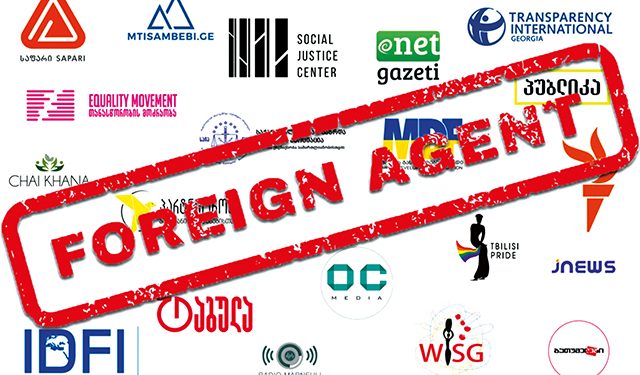First published on GFSIS
In the last few days, it came to light that one of the, to put it mildly, Eurosceptic political groups had created and submitted to Georgian Parliament a draft law that, similarly to the Russian Federation, aims to label non-governmental organizations that receive funding from foreign states, associations, or international organizations as “agents of foreign influence” and impose a number of restrictions upon them (90% of these organizations are funded as mentioned).
However, the bill has yet to be made public. According to the information obtained by Radio Liberty, its main provisions include the following principles: All non-entrepreneurial (non-commercial) legal entities, including all non-governmental organizations, that receive 20 percent or more of their yearly funding from a “foreign power” will be considered agents of foreign influence, as will television channels that receive 20 percent or more of their yearly funding from a “foreign power” and mass media organizations, including newspapers and online media outlets, that receive 20 percent or more of their yearly funding from a “foreign power”. This strange and somewhat confusing terminology – foreign power, is used to refer to branches within foreign state government systems, citizens of foreign countries, legal entities that are not based/founded in Georgia, and organizations, including foundations, that are established under the law of foreign states and/or international law.
According to this bill, it will be mandatory to register such organizations in a separate register of “agents of foreign influence”. They will also be subject to administrative penalties for avoiding registration in the relevant database and will be subject to a special regime of financial monitoring by the state.
A very similar sort of law was adopted by Russia in 2012, which was highly criticized and deemed as discriminatory in resolutions adopted by the European Parliament and the Parliamentary Assembly of the Council of Europe. 61 non-governmental organizations in Russia filed an appropriate lawsuit in the European Court of Human Rights of the Council of Europe, which, in a decision issued on June 14, 2022, accused the Russian government of violating several conventions of the Council of Europe as well as a convention adopted under the auspices of the United Nations as a result of this law.
In the justification of the issued decision, the court used the conclusions of authoritative organizations such as the Venice Commission, the Council of Europe Commissioner for Human Rights, and other influential international human rights organizations. All these organizations point out that the main articles of the law, which refer to the concept of “agent of foreign influence”, separate registration of such organizations, special monitoring measures and a special regime of inspections, the method of financing, etc, are discriminatory and unfair, and cannot be justified by arguments regarding national security concerns. With this ruling, the Court of Human Rights of the Council of Europe sought the repeal of the aforementioned law and the payment of adequate damages of more than one million Euros to 61 non-governmental organizations as a result of the harm to their reputation.
A similar law was also passed in 2017 by the Hungarian government, which has recently taken a more Eurosceptic stance. The Court of Justice of the European Union has since discussed the matter at hand, and as a consequence, the court’s ruling called for the repeal of the discriminatory law by the Hungarian government. As is well known, the decisions of the Court of Justice of the European Union are final, irrevocable, and binding on the member states.
Aside from Hungary, no other EU member state has such a discriminatory approach regarding the sources of funding of organizations. An exception is seen only in regard to the control mechanisms established for the prevention of terrorism and financing of international crime, which exist in all democratic countries and have nothing in common with the bill proposed in Georgia.
I want to underline the fact that the Georgia-EU Association Agreement (2014) states the following in the preamble: “…WILLING to contribute to the political, socio-economic and institutional development of Georgia through wide-ranging cooperation in a broad spectrum of areas of common interest, such as the development of civil society, good governance, including in the field of taxation, trade integration and enhanced economic cooperation, institution building, public administration and civil service reform and fight against corruption, the reduction of poverty and cooperation in the field of freedom, security and justice necessary to effectively implement this Agreement and noting the EU’s readiness to support relevant reforms in Georgia…”; That is, with this note, the government of Georgia agrees to cooperate with the European Union for the development of civil society, which in itself implies (as it happens in the case of all other types of cooperation) the granting of EU funding in projects implemented by local non-governmental organizations to support reforms. Based on this record, any lawyer would view the “agents of foreign influence” law as an attempt to undermine the spirit of the Association Agreement and the basic principles of cooperation.
It is necessary that the Parliament of Georgia takes these circumstances into account and does not allow such a bill to even be put to a vote (which would be a great shame for our entire society and damaging for the country and its European future). If it does happen, the Venice Commission will deem it unfavorable, the European Parliament will criticize it, the European Commission will consider it as a setback for democracy, and, most importantly, results will be transferred as a relevant record in the new recommendation of the European Commission on granting Georgia candidate status for membership, which will be published in September of this year. Conclusively, Georgia will fail to receive the long-awaited candidate status, and it will be unclear as to how much longer we will have to fight and fix the resulting damage.
Hopefully, this topic will be actively and professionally covered by Georgian human rights organizations and lawyers. In addition, I hope that appropriate attention will be given to this matter by the entire civil society of Georgia.
Blog by Kakha Gogolashvili, GFSIS Senior Fellow and Director of EU Studies, for GFSIS









